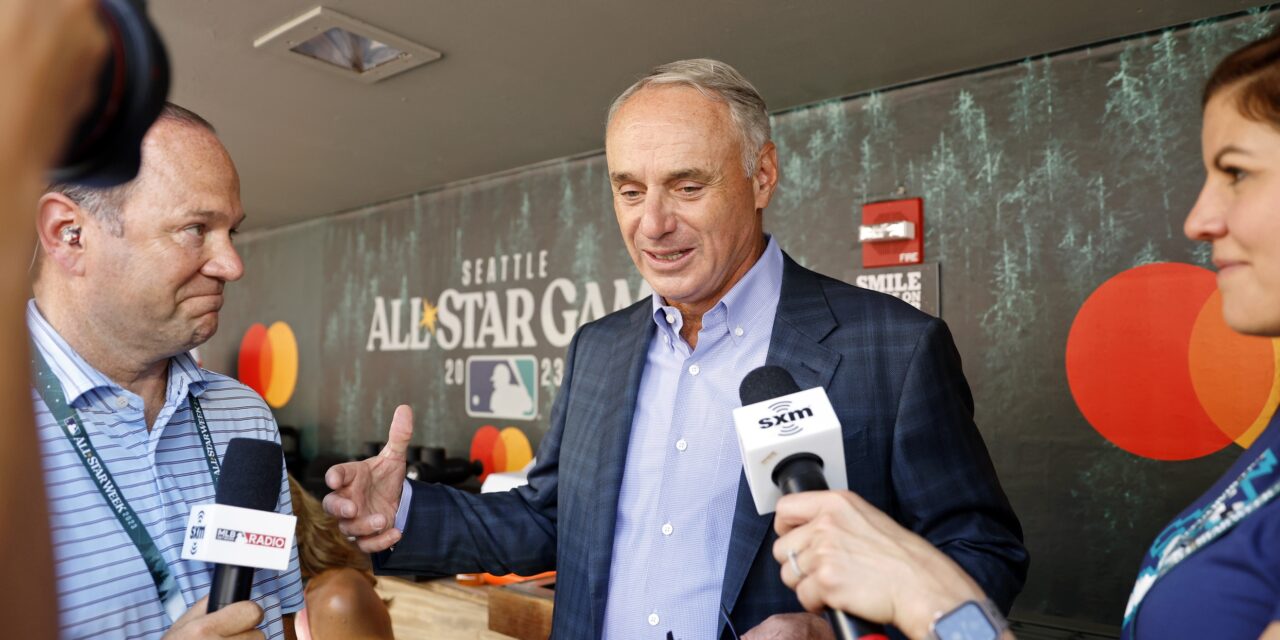Written by Greg Jones
The startling elimination of top seeds in the division round and the ascension of two wildcards to the World Series have spurred much discussion on the playoff system that was put in last year. I have a suggested new format. So do you. But let’s start out by looking at the goals of a playoff system and the perceived shortcomings in the current system.
In my opinion, the goals of a postseason structure should be:
1. Determine the world champion. Many folks think this is the birthright of the team with the most regular season wins. But until there is a totally balanced schedule, might they just be blessed with a weak division? Might they have benefited from a second-half schedule heavy in tanked teams playing their farmers? Or might that team just have had an unusual dose of old-fashioned luck? Baseball Reference actually has a stat called “Luck” based on the Pythagorean formula, an estimate of what the team’s record *should* have been by runs scored and runs allowed. Developed by Bill James, it has real validity given a big enough sample of a full season. The Mets *should* have been 80-82 in 2023, five games better than their actual 75-87 record. Only two National League teams had worse “luck” in 2023. But that’s a teary bottle of scotch discussion for the hot stove.
Suffice it to say that the combination of the regular season record properly weighted in a tournament against top teams is the best formula.
2. Deliver highly entertaining and dramatic postseason play. This isn’t something easily imposed by regulation, but….how do you have more edge-of-your-seat playoff games? How do you get more “winner take all” games, that Game 7 atmosphere? There was only one this year and only two last year.
3. Keep as many teams as possible in the running for as long as possible, avoiding mid-season tanking, empty stadiums, and a pennant race being decided by whose schedule is heaviest with tanking AAA teams. Keep hope alive.
4. Weight the structure to give higher seeds a true competitive advantage. This both makes the regular season relevant and ensures that the world champ, if a wildcard team, achieved something truly championish.
Perhaps this year was an outlier, with the three highest payroll teams missing even the expanded playoffs, and the American League wild card 5 seed tilting against the National League wild card 6 seed in the World Series. The performance of a baseball team over a regular season marathon is subject to the hands of fate in many ways…some vets get suddenly old, some rookies suddenly bloom, and, of course, injuries can take down your biggest juggernaut teams. A 100-win team whose starting rotation goes down might just get swept out in its first playoff series, you know, like the Dodgers. A slugging team, even one flawed in other areas, always has a slugger’s chance for a deep playoff run. In boxing, it’s called a puncher’s chance. Like Rocky, in, you know, Philadelphia.
So the Cinderella factor is there and always should be; it is good business to keep the most fans excited as long as possible. It sells tickets and Toyotas.
However, if there isn’t a significant advantage to being a higher seed, the unintended consequence could be the opposite, with teams throttling down once they clinch a playoff berth. After all, the 4 seed gets at least two more games than the 2 seed, right?

Joe Nicholson-USA TODAY Sports
The other two quick factors thrown out were the vaunted “bye” becoming referred to as the “playoff layoff”…perhaps a higher seed’s hitters, in particular, don’t benefit from a week off? For example, the Dodgers, with six days off, scored six total runs while getting swept in three by the Diamondbacks.
And the three-game wild card round and days off allowed the wildcard Phillies to start ace Zack Wheeler in Game One of the wild card series and then Game Two of the division series.
So here is my proposal. If the goal is tamping down wild cards, this may seem initially counter-intuitive, but bear with me.
Add another wild card team in each league, the seven seed. But make the path for a wild card champ brutal.
First, the wild card round goes back to one-game sudden deaths, no days off. Nothing is more exciting than a one-game elimination winner-take-all all, ala Game 7s and “the Giants win the pennant!” There were a total of only three winner-take-alls the last two years — this guarantees six minimum.
Wild card Round, commencing one day after the end of the regular season:
Seed 7 at Seed 4
Seed 6 at Seed 5
Next day
Lower Seed at Higher Seed
Next day
Division Series begins with a seven-game series, a fairer way to determine the better team and a further advantage to the high seeds who might pitch their aces twice.
Is this too tough on the wild card teams? Maybe, although the 4 and 5 seeds might simply have two home games back to back. But that Cinderella 7 seed would have to win on the road, travel and win on the road, then travel and start the division series the next day.
Too much? Tough, you should have won your division or seeded higher.
In this format:
- more teams will stay engaged throughout the season, with fuller stadiums and fair competition for a full season. With a seven-seed out there, a tanking team would have to be truly hopeless and put that narrative to their fans.
- yes, there is an extra wild card, but unlike the current format, only ONE wildcard team advances to the Division round, so you are guaranteed a division winner in the Championship Series.
- the division winners avoid that “playoff layoff” with only four days off between the final day of the season and the start of the division series, enough to set their rotation without dulling their batters’ eyes (if that is a thing.)
- it avoids a division winner getting tripped up in a five-game series by a wildcard, only getting 3 or 4 games and two home games out of a division title.
- guaranteeing at least six games, three in each league, of the most exciting spectacle in baseball — the winner-take-all all.
So, that’s my idea.
Now, I had a wrinkle here, but I held it out because it is the most unorthodox, and I don’t want readers to fixate on it. However, I ran it by a sabermetric board and was surprised at the support. The idea is to make the seventh seed the team with the best second-half record and no seeding otherwise. That keeps, seriously, every team in…even if you have an injury-plagued team of kids, hope springs eternal. Even if you object to a team making it into the tournament on half a season, look at the road they face. And, really, is that seventh seed too high a price to eliminate the tanking debacle, where championships are often decided by how slick their GM is at July trades?
A final thought — even with the frantic two-day wild card tourney, three seven-game series may push the schedule into November. My suggestion would be to eliminate that day off between Games 2 and 3, and soften the travel crunch by making every Game 2, probably the least consequential, an old-fashioned afternoon game.
* * * * * * *
This MMO Fan Shot was contributed by Greg Jones. Have something you want to say? Share your opinions with the best and most diverse Mets community on the web! Send your Fan Shot to [email protected]
















